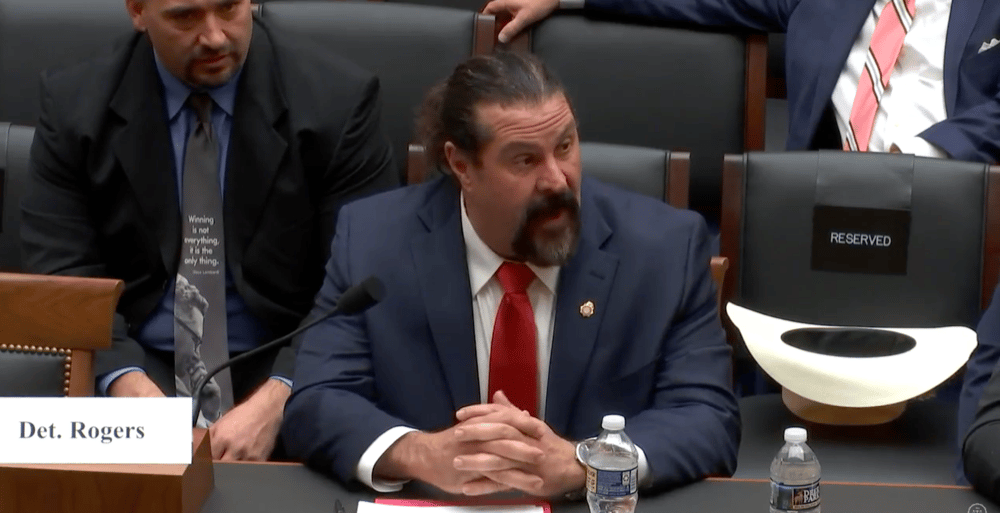
Det. Nick Rogers, the president of the Denver Police Protective Association, appeared this morning before a U.S. House of Representatives subcommittee.
That's notable enough. What's unusual is that the police union leader was criticizing the city government on the national stage.
The committee hearing was titled "The Effect of Sanctuary City Policies on the Ability to Combat the Opioid Epidemic." In other words, legislators and experts were set to argue about whether policies that protect immigrants also make it harder to enforce laws. (Watch it here.)
First, context:
Denver passed a law in 2017 that forbids employees from asking about people's immigration status and from sharing that information with the federal government. Officials also can't hold people in jail on "civil detainers" just because ICE is interested in them -- there has to be a criminal-justice reason.
The changes were meant in part to "disentangle" the local government from federal immigration enforcement, arguably allowing immigrant communities to report crimes and go to court more freely. The changes also addressed constitutional concerns, officials said.
The law has drawn backlash from Attorney General Jeff Sessions. And, today, Rogers joined other law-enforcement agents to tell legislators that such policies limit cops' ability to crack down on drug dealers.
Denver police leaders disagreed with Rogers' claims, and deputy police chief Matt Murray said the department is "looking into" whether Rogers violated any city rules with his appearance or the actions he described.
Rogers' comments:
Essentially, Rogers said that he needs to be able to get suspected drug dealers deported.
"My membership, they're not happy. They feel that they're being handcuffed. They're being not allowed to do their jobs," Rogers said at the committee hearing. He claimed in written testimony that the "common story" for heroin dealers was that they were young men from Mexico and South America.
Before Oct. 2017, he said, " ... I would call these two ICE agents, and I knew that if I contacted them and they showed up, that I would never see that specific heroin dealer on the streets of Denver again."
However, he also noted in his written testimony that many suspects had returned after being deported.
"How is deporting them helping? He’s eroding his own argument," said deputy chief Matt Murray in an interview this afternoon. "He’s saying that by deporting people he’s going to do a better job with crime, and yet these people have (already) been deported."
Police pushback:
City officials countered the idea that federal agents are hampered in Denver. They told the committee in a written statement that immigration agents and the Federal Bureau of Investigation have access to biometric data and fingerprints on everyone who enters the jail.
"Denver’s choice to limit its involvement in the civil enforcement of federal immigration laws ... should not be confused with our ongoing commitment to enforce criminal drug laws," it read. "If such individuals go on to commit crimes – including drug crimes – while present in the United States, they are subject to arrest and criminal prosecution just as any other person would be."
Murray also questioned how an officer would know a suspect's immigration status. "In 2011 the, responsibility for determining somebody’s immigration status went to the jail," which is run by the Denver Sheriff Department, he said.
The deputy chief said that Rogers "does not represent" the city or its police department.
"It’s so much more complex than, 'We have undocumented people who are selling drugs. There are a lot of people who are selling drugs — and just to suddenly say that the heroin policy is a result of immigration policy, he would need to support that with a lot of more information than just his stories of what he sees in southwest Denver," Murray said.
More reactions:
"How are you supposed to know somebody is an immigrant? We have a profiling policy too. You have to be pretty careful here too. I’m curious how you just know this person is an undocumented without asking."
Prof. Keith Humphreys of the Stanford University School of Medicine said that the opioid crisis reigns even in cities with few immigrants.
"This epidemic was made in America. Not somewhere else," Humphreys said. He suggested that the federal government take on other policies, such as ensuring that insurance covers non-opioid pain treatment.
In a statement to the Denver Post, Deputy Chief Matt Murray denied that the immigration policy was hampering policy.
“There are some people who feel like this ordinance inhibits their ability to prosecute crime,” he told Noelle Phillips. “We could not feel stronger in the opposite direction.”
Rep. Pramila Jayapal, Democrat of Washington, described the hearing as "scapegoating."
"Immigrants are certainly not making the opioid crisis worse. Alleging that deporting or cracking down on immigrants is somehow going to fix that situation is a falsehood," she said. "We know we cannot arrest our way out of the opioid crisis."
Meanwhile, Rep. Steve King, Republican of Iowa, claimed that if everyone woke up in their native country tomorrow, the flow of illegal drugs would largely stop.
The hearing concluded at 8:18 a.m. It consisted mostly of verbal sparring. No significant action was taken.










